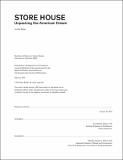| dc.contributor.advisor | Miljački. | en_US |
| dc.contributor.author | Barker, Kyle (Kyle Lawrence) | en_US |
| dc.contributor.other | Massachusetts Institute of Technology. Department of Architecture. | en_US |
| dc.date.accessioned | 2014-05-23T17:14:55Z | |
| dc.date.available | 2014-05-23T17:14:55Z | |
| dc.date.copyright | 2014 | en_US |
| dc.date.issued | 2014 | en_US |
| dc.identifier.uri | http://hdl.handle.net/1721.1/87138 | |
| dc.description | Thesis: M. Arch., Massachusetts Institute of Technology, Department of Architecture, 2014. | en_US |
| dc.description | This electronic version was submitted by the student author. The certified thesis is available in the Institute Archives and Special Collections. | en_US |
| dc.description | Cataloged from student-submitted PDF version of thesis. | en_US |
| dc.description | Includes bibliographical references (page 234). | en_US |
| dc.description.abstract | Since 1950 the average US home has grown from 1100 square feet to over 2600 square feet. During this same period the average family size shrunk by a person, meaning that per capita residential square footage has more than tripled in less than 60 years. What's more, if one looks at residential storage capacity as an indicator of consumption, its notable that the average citizen has 830% more storage space today than they did in the fifties. Paradoxically, in the last decade other forms of ownership have lost favor. The appetite for conventional ownership has been, in part, supplanted by a disinterest in maintenance and responsibility. Subscription services have begun to replace the conventional retail transaction. At first people rented the intangible and ephemeral but in the last few years they have begun renting things that would have seemed technologically impossible, or at a minimum improbable, ten years ago. This new mode of collective ownership represents a societal shift that architecture is lagging behind. This thesis aspires to use the spatial generosity of storage and the burgeoning sharing economy to re-imagine a suburb that promotes the sharing of rarely used objects & spaces amongst neighbors to foster community and reduce consumption. | en_US |
| dc.description.statementofresponsibility | by Kyle Barker | en_US |
| dc.format.extent | 236 pages | en_US |
| dc.language.iso | eng | en_US |
| dc.publisher | Massachusetts Institute of Technology | en_US |
| dc.rights | M.I.T. theses are protected by copyright. They may be viewed from this source for any purpose, but reproduction or distribution in any format is prohibited without written permission. See provided URL for inquiries about permission. | en_US |
| dc.rights.uri | http://dspace.mit.edu/handle/1721.1/7582 | en_US |
| dc.subject | Architecture. | en_US |
| dc.title | Store House : unpacking the American dream | en_US |
| dc.title.alternative | Unpacking the American dream | en_US |
| dc.title.alternative | Store House | en_US |
| dc.type | Thesis | en_US |
| dc.description.degree | M. Arch. | en_US |
| dc.contributor.department | Massachusetts Institute of Technology. Department of Architecture | |
| dc.identifier.oclc | 880134474 | en_US |
